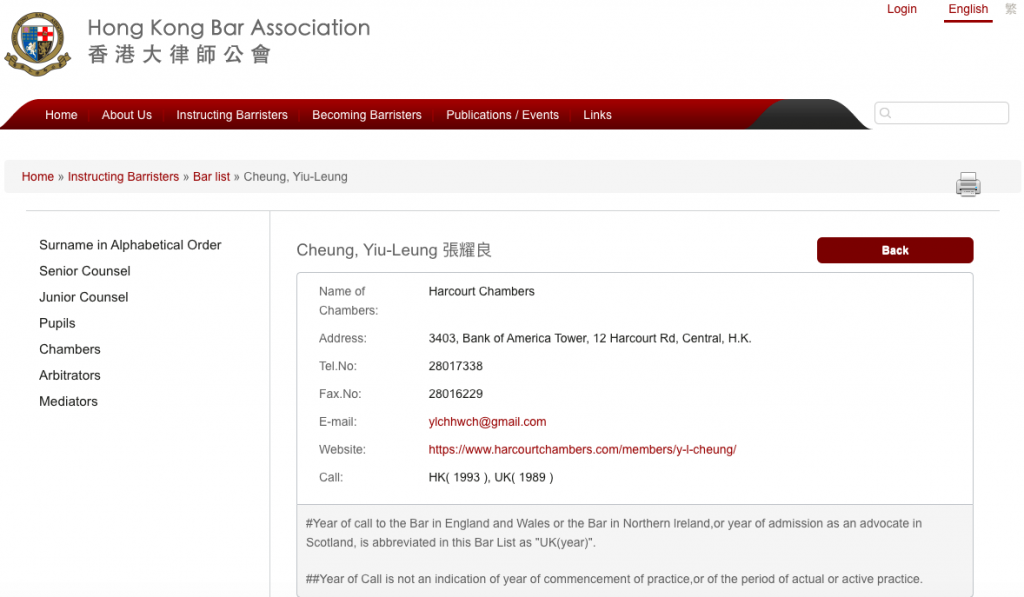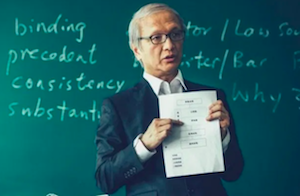This is very interesting – the first shot over the bows from a member of the HK Bar?
As far as we are aware we think so.
Cheung Yiu-leung has written an opinion-editorial on the evolution of the Chinese human rights lawyer community since the 709 Crackdown for the occasion of the Crackdown’s fifth anniversary.
The question is; will he now be sanctioned by the police or government for airing free speech
Cheung Yiu-leung – Open Op-Ed: Post-709 China Human Rights Lawyers Movement
The China human rights lawyers movement has become increasingly quiet in recent years, many perceive that this was due to the impact of the 709 Crackdown in 2015.However, if we look back to the era of Hu Jintao’s second term of presidency of the People’s Republic of China, after around 2008, China has intensified its suppression on human rights lawyers. Broadly speaking, the large-scale arrest of human rights lawyers in July 2015 was only a reflection of the rule of law deteriorating in the past decade in China.
It is not easy to clearly define China human rights lawyers. In the past, lawyers who were willing to take on “sensitive” cases to protect human rights and civil rights, as well as those who have stated that they would be willing to do so despite opposition from the authorities are all considered human rights lawyers. First, there are those who stand in the forefront and have been willing to take action, this means those who use all available legal methods to fight cases that are evidently unjust, have been willing to continue despite suppression, and to fight till the end for justice. These are some of the toughest, most courageous and most well-known human rights lawyers. Apart from seeking justice through legal procedures, they often also openly criticise the country’s legal system and institutions. Furthermore, they are often connected through irregular and unsystematic organising, and are often involved in public affairs. They share their experiences with and support each other, as well as express support to human rights lawyers who have been suppressed, and the cases that they have been defending. Inevitably, this would include said lawyers pointing out inappropriate behaviours of local public security, procuratorate, and court officials and departments, resulting in retaliation from these officials, such as lawyers being abducted, violently beaten up, being stopped mid-speech in court, and even court officials violently attacking and insulting lawyers.
In July 2015, there was a large-scale clampdown on lawyers, with the 200-odd human rights lawyers who were arrested mostly belonging to the aforementioned category. We cannot say that all human rights lawyers have been captured during the 709 Crackdown, since this is not true. Multiple well-known human rights lawyers were not arrested at the time, and have not been persecuted after the Crackdown. We are not sure about the reason behind this, Chinese law enforcement officials often don’t have a set of rules or standards regarding their behaviour that all officials in the country abide by. We noticed that a number of human rights lawyers who are not as reformist as those mentioned before were not arrested in July 2015. This type of lawyers do not normally clash with the authorities, and would not openly criticise the government. These lawyers have always taken on human rights cases, but they are more discreet, and would not overtly participate in meetings and activities with other human rights lawyers, and so have not encountered serious suppression.
That is not to say the since July 2015 there have not been any suppression. In recent years, there has indeed been a decrease in the triad-style abductions, physical attacks and threats. Replacing these practices are lawyers being summoned to meet officials, who would “remind” them, or even verbally threaten them, as well as monitoring the cases that the lawyers take on, their communications, and not allowing certain lawyers to pass their annual inspections, even threatening or shutting down law firms who would employ rebellious lawyers, forcing these lawyers to be fired. From September 2017 to January 2019, more than 35 human rights lawyers and law firms have had their licenses revoked, cancelled, or suspended for exercising their freedom of assembly, of association, of speech, and carrying out their duties as lawyers.
There are also lawyers who have taken on public interest cases, such as those regarding labour rights, domestic violence, juvenile delinquency, and compensation for injury and death. These lawyers may still face pressure if there are officials or local forces involved in these cases, but they are very prudent and only take action when they see right. Lawyers taking on public interest cases still offer a very helpful hand to people seeking legal justice. Although we do not have the statistics, we can observe that public interest litigation lawyers are definitely still active in the country.
Under the current political climate, Chinese human rights lawyers are shouldering immense pressure, but human rights lawyers as a community have yet to be eliminated. Recently, Beijing human rights lawyer Liang Xiaojun said in an interview in May 2020, “As long as there is injustice in society, there will be human rights lawyers.” The truth is the awareness of the need to defend rights is on the rise among lawyers in mainland China; under the heavy political pressure, although there is less space for lawyers in civil society, with less lawyers openly criticising the government, or protesting outside courthouses, there are still a number of lawyers who are willing to help their clients with miscarriage of justice, such as the recent case of Xie Liuqing, whose enterprise was framed by local forces, the case of Wang Yongming in Baotou City, Inner Mongolia, and the case of Ge Linlin from Fuyang City, who was suspected of severe omission involving police organs, procuratorate and courts. Lawyers continue to work discreetly to fight these unjust cases across the country.
Using Hong Kong jargon, the human rights lawyers movement in China is “blossoming everywhere”, with everyone continuing to work on their part of the movement, instead of openly assembling physically to allow for easy capture by the authorities. Lawyer Liang Xiaojun quoted Jerome Cohen in his interview: “While the space for [human rights lawyers] is shrinking and treacherous, we should focus on preserving ourselves and improving our professional skills as we wait for a better time to come.”
The 709 wives (including Li Wenzu, Yuan Shanshan, Liu Ermin and Wang Qiaoling) piece follows…
?Overcoming Hardship Together —— Our Side of the Story on the 5th Anniversary of the 709 Crackdown?

It is already the 5th anniversary of the 709 Crackdown. Looking back, we felt that we were stumbling in every single step that we took.
Before the 709 Crackdown in 2015, we were all housewives who would never participate in our husbands’ work. We didn’t understand the dangers and difficulties that they confronted at work. That’s why we felt like it was such a huge catastrophe when the police suddenly came to confiscate our home, and when our husbands were suddenly made to disappear.
At this juncture, Yuan Shanshan – the wife Xie Yanyi – was the first one to use legal means to start our rights defence movement. She sued the Xinhua News Agency after reading an article defaming her husband published by the outlet. She stayed up late one night and wrote an indictment against the Xinhua News Agency, later publishing this online. On the following day, security agents went to her home and asked her to tell them honestly who helped her draft the indictment. The security agents threatened her to remain silent, or else she would suffer the consequences.
The legal measures initiated by Yuan Shanshan greatly encouraged us. In these five years, we have initiated countless administrative reconsiderations, administrative litigations, complaints and lawsuits.
We also took to other means to protest: a “red bucket show” at the Tianjin No.2 Intermediate People’s Court, a fashion show at the Supreme People’s Procuratorate, shaving our heads outside the Supreme Court (Quote: I can be hairless, you can’t be lawless), a campaign action of walking from Beijing to Tianjin to find our husbands etc.
We have been detained for around 20 times over the past five years. Ermin – wife of activist Zhai Yanmin – was forced to go back to Beijing while looking for her husband in Tianjin. She was beaten up by the police until she fainted while at the police station in Yongning Town.
Qiaoling – wife of Lawyer Li Heping – underwent criminal summons at the police station of Yizhuang Development Zone Boxing Road after appointing a lawyer for her husband to sue Xinhua Net .
Wenzu – wife of Lawyere Wang Quanzhang – was in the middle of searching for her husband on barefoot, when she was taken back to her home in Beijing. She was forced to climb onto the balcony to scream out the shamelessness of the authorities to the people downstairs, as she was blocked from descending from her own home on the fifth floor by up to 100 people, including allegedly residents from the Shijingshan District, plainclothes security agents and rogues.
We were forced to move for several times. We are already used to being stalked, being harassed, and being questioned by security agents. Our young kids were kicked out from school, and deprived of proper education; our kids who graduated from high school were deprived of the freedom to study abroad due to passport restrictions.
Filled with grief and indignation, we have gone through all these things. However, when we look back now, we smile with tears in our eyes, since we have no regrets, and we have passed through the valley of death together.
Seeing people coming back alive from the “709 Crackdown” prosecutions, and being able to live with smiles on our faces, we must thank you all for your never-ceasing attention to our cause. We are sincerely grateful for all the help.
We would like show our gratitude to the community of Chinese human rights lawyers. They stood up and defended us at our hardest and most dangerous times, giving us tremendous help and support. Some of them were brought in to be questioned, some had their licenses suspended, revoked, and some were even arrested. They gave us help at the cost of their freedom and careers.
We must show our thanks to our big sister Ye Jinghuan’s human rights defence team, who accompanied and supported us along the way throughout past five years, and has not stopped doing so to this day.
We are also very grateful for the objective and fair reporting by Hong Kong and foreign media. In Mainland China, the national media often reports falsely. The media sees our cause as “politically sensitive,” which was why the news we publicized were always swept under the carpet. This kind of suppression, which utilises the deprivation of freedom of speech and violation of the Chinese Constitution stopped us from sharing more information about our rights defence movement for those affected by the “709 Crackdown”, even leading to general fear by the public upon hearing someone mention the “709 Crackdown”. Only by having objective and fair reporting of the “709 Crackdown” could we truly reflect to the world our journey and experience of human rights defence.
Finally, we would like to show our respect to everyone who have supported and continues to support victims of the “709 Crackdown”! Your love and determination to fight for justice have been our motivation to carry on. We will not stop our journey here, and are more determined than ever to continue on!
Family members of 709 Lawyers
Li Wenzu, Yuan Shanshan, Liu Ermin, Wang Qiaoling
2020.7.





